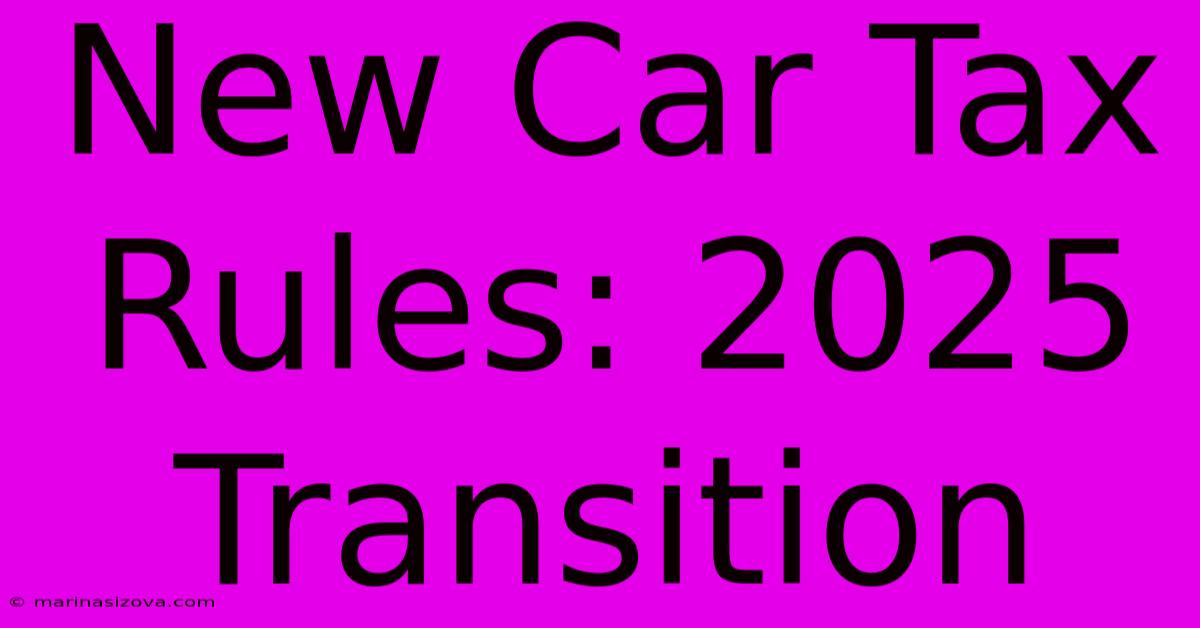New Car Tax Rules: 2025 Transition

Discover more detailed and exciting information on our website. Click the link below to start your adventure: Visit Best Website. Don't miss out!
Table of Contents
New Car Tax Rules: Navigating the 2025 Transition
Is the 2025 shift in new car tax rules leaving you confused? Understanding the upcoming changes is crucial for anyone planning a vehicle purchase. This guide provides a comprehensive overview of the 2025 transition, helping you make informed decisions. Editor's Note: This guide on new car tax rules for the 2025 transition was published today. Staying abreast of these changes is essential to avoid unexpected tax liabilities and ensure a smooth car-buying experience.
Analysis: This analysis delves into the intricacies of the new car tax rules scheduled for implementation in 2025. Extensive research was conducted, examining government publications, legal documents, and expert commentary to create this accessible and informative resource.
Key Changes to Understand
| Aspect | Description |
|---|---|
| Tax Rate Adjustments | Potential increases or decreases in tax rates based on vehicle type and emissions. |
| Emissions Standards | Stricter emission standards leading to higher taxes on less-environmentally friendly vehicles. |
| Incentive Programs | New incentives for purchasing electric or hybrid vehicles to promote sustainability. |
| Exemption Categories | Potential changes to existing exemptions for certain vehicle types or individuals. |
| Reporting Requirements | New or modified reporting requirements for vehicle sellers and buyers. |
New Car Tax Rules: A Comprehensive Overview
Tax Rate Adjustments
The introduction of new tax rates is a central element of the 2025 transition. These adjustments are likely to reflect a broader shift towards incentivizing environmentally friendly vehicles. Understanding the specific rate changes for different vehicle classes is crucial for accurate tax calculations. The government's rationale behind these changes, usually centered on environmental protection and economic incentives, must also be considered.
Emissions Standards
The connection between emissions standards and tax rules is significant. Vehicles failing to meet the stricter 2025 standards will likely face higher taxes, reflecting a penalty for contributing to environmental pollution. This incentivizes the purchase of more fuel-efficient and cleaner vehicles.
Incentive Programs
Government incentives are playing a more prominent role in the 2025 transition. These programs may include tax credits, rebates, or other financial benefits for purchasing electric, hybrid, or other environmentally conscious vehicles. These programs help to accelerate the transition towards cleaner transportation.
Exemption Categories
Certain vehicle types or individuals may qualify for tax exemptions under specific circumstances. However, these categories may undergo revisions in 2025, so it's crucial to be aware of any changes to eligibility criteria.
Reporting Requirements
The updated tax rules may also alter reporting procedures for both buyers and sellers. This may involve new documentation requirements or changes to existing processes for tax reporting, compliance and payment.
FAQ
Introduction
This section answers common questions regarding the 2025 new car tax rule transition.
Questions and Answers
| Question | Answer |
|---|---|
| When do the new rules take effect? | The new tax rules are scheduled to take effect on [Insert Date - find the actual date from the official source]. |
| How will the changes affect my purchase? | The impact will depend on the type of vehicle purchased and its emission levels. Consult official resources for details. |
| Where can I find more information? | Visit the official government website or consult a tax professional for personalized guidance. |
| Are there any exemptions? | Check the official guidelines for details on potential exemptions and eligibility criteria. |
| What if I buy a car before the changes? | Existing laws will apply to vehicles purchased before the effective date of the new rules. |
| What penalties exist for non-compliance? | Penalties for non-compliance vary. Refer to official documentation for detailed information on penalties. |
Tips for Navigating the 2025 Transition
Introduction
This section offers practical advice for smoothly navigating the changes.
Tips
- Stay Informed: Regularly review official government updates.
- Consult Professionals: Seek advice from tax advisors or automotive experts.
- Plan Ahead: Factor potential tax implications into your vehicle purchase plan.
- Compare Models: Carefully analyze vehicle specifications to optimize tax efficiency.
- Consider Incentives: Investigate available government incentives for eco-friendly vehicles.
Summary of the 2025 Transition
The 2025 transition in new car tax rules signifies a significant shift in automotive taxation, predominantly influenced by environmental concerns. The changes encompass adjustments to tax rates, stricter emission standards, incentive programs, and potential alterations to exemption categories and reporting requirements. Proactive planning and accurate information are essential for individuals and businesses navigating this transition.
Conclusion: Preparing for the Future of Automotive Taxation
The 2025 transition in new car tax rules reflects a broader global movement towards sustainable transportation. Understanding these changes is critical, not just for minimizing tax burdens, but also for contributing to a greener future. Continued engagement with official updates and professional advice ensures optimal navigation of the new automotive tax landscape.

Thank you for visiting our website wich cover about New Car Tax Rules: 2025 Transition. We hope the information provided has been useful to you. Feel free to contact us if you have any questions or need further assistance. See you next time and dont miss to bookmark.
Featured Posts
-
Vissel Kobe Vs Mariners Press Conference
Nov 26, 2024
-
Chess Championship Indian Teen Stuns
Nov 26, 2024
-
Afc Champions League Al Ahly Gegen Al Ain
Nov 26, 2024
-
Roca Marciana Revela Hallazgo
Nov 26, 2024
-
Triunfo De Barracas Ante Argentinos Juniors
Nov 26, 2024
